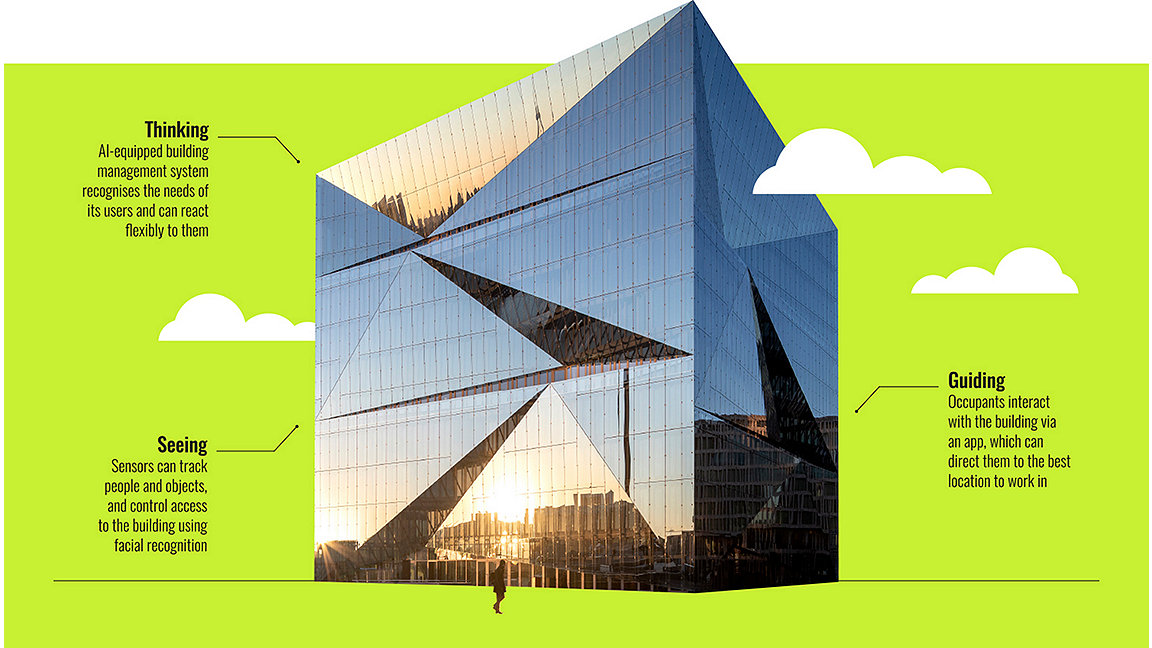
How the Cube in Berlin’s “brain” can help “pandemic-proof” the building
Just as COVID-19 has ushered in remote working to the mainstream years before it would otherwise have been widely adopted, so the same could be said for smart technology. The way in which facilities managers can harness smart systems to make more informed decisions, especially in light of new safety and security protocols, has been thrown into sharp relief.
Robert Thorogood, executive director with engineering consultant HDR | Hurley Palmer Flatt sets out some context, stating: “Smart buildings deliver a solid foundation to enhance a building's attractiveness, sustainability and efficiency.”
RICS’ property standards director, Paul Bagust, adds that utilising an internet of things (IoT) approach can revolutionise facilities management in the COVID-19 era, to “reconsider the use of space, advising asset owners and users on the most effective use of buildings to meet changing demands of workforces”.
Phil Ratcliffe, who heads up Drees & Sommer’s UK operation, explains how the consultant applied that thinking on the Cube – a 210,000 ft2 (19,500 m2) development in Berlin dubbed “Europe’s Smartest Multi-tenant Office”. “This building has a brain that enables it to bring separate systems together, looking at planning, operational and user data.” This artificial intelligence learns from said data, detecting which spaces in the building don’t need heating or lighting. Being able to drill down into that detail is an essential tool when FMs are managing buildings’ operational cost. This is true of when occupation is significantly reduced during the time of COVID-19 and also looking ahead to a future of staggered work times and a blended schedule of homeworking and office-based work.
As people return to work, perhaps in designated work “bubbles”, smart technology can help here, too, says Harry Badham MRICS, UK head of development at Axa Real Estate. An app that controls access, for example, could determine who can enter which lift.
An app of this kind would pass what Google CEO Larry Page dubs the “toothbrush test” – something you will use twice a day, in this case to get in and out of the building. Badham envisages that 22 Bishopsgate, Axa’s City of London skyscraper with more than 1.275m ft2 (118,500m2) of flexible workspace, will harness such technology. Occupants will be able to reserve a meeting room, pay for lunch and book a gym class all in one place. And, when cleaning regimes are under more scrutiny than ever to keep those occupants safe, it is extremely useful for FMs to have insight into which parts of the building are being used, at what time and for how long.
“Smart technology will actually make FMs more valuable, as they can provide strategic guidance on all this data” Harry Badham MRICS, Axa Real Estate
Another strand to smart technology is the digital twin, which “reconciles the need for detecting and diagnosing a building’s infrastructure, checking millions of test points daily”, says Badham. He adds that half the faults could be mediated by smart technology, which raises the question of whether this spells the end for the FM on the ground.
Far from it, says Badham. “It will actually make FMs more valuable, as they can provide strategic guidance on all this data.” Air quality, which is at the forefront of stakeholders’ minds in a world with COVID-19, can, for instance, be closely monitored and the amount of fresh air coming into a building adapted as needed.
Using technology to analyse data for HVAC (heating, ventilation and air-conditioning) and other parts of building control will give greater forecasting ability and shape how the discipline evolves, as Ratcliffe points out. “The future of FM is more about predictability and less of a helpdesk.”
“The future of FM is more about predictability and less of a helpdesk” Phil Ratcliffe, Drees & Sommer